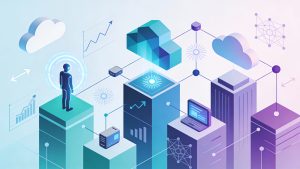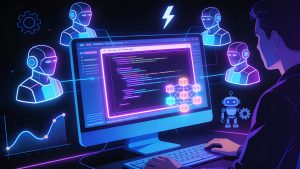August 2025 marked a defining shift in GitHub’s AI-powered development ecosystem. With the arrival of GPT-5, greater model flexibility, security enhancements, and deeper integration across GitHub’s platform, developers now have access to tools that fundamentally reshape workflows. From smarter coding assistance to end-to-end automation, these updates represent the evolution of GitHub from a coding platform to a comprehensive AI-driven development hub.
GPT-5 Integration: A Major Leap Forward
The highlight of August 2025 is the integration of GPT-5 into GitHub Copilot. Available across Visual Studio, JetBrains IDEs, Xcode, and Eclipse, this model brings unparalleled reasoning capabilities and code quality improvements.
Unlike earlier versions that assisted line by line, GPT-5 can implement entire systems with advanced error handling, authentication solutions, and security protocols. Fully featured modules — such as authentication flows with JWT tokens and password reset functions — can now be generated seamlessly in a single request. This turns the AI assistant into an effective collaborator, handling complex tasks that previously required extensive back-and-forth guidance.
GPT-5 Mini: Optimized for Speed
Alongside GPT-5, GitHub introduced GPT-5 Mini, a streamlined alternative offering faster responses and lower operating costs. It targets developers who need quick iteration cycles without compromising on reliability. This makes it ideal for day-to-day coding where instant suggestions matter more than heavy-duty reasoning.
More Choices With Claude Opus 4.1
GitHub also expanded its AI lineup by adding Anthropic’s Claude Opus 4.1. Positioned as a strong option for code review and refactoring, Claude Opus complements GPT-5’s depth and GPT-5 Mini’s speed. Developers can now choose from multiple models depending on their needs, including existing options like GPT-4o, Claude 3.5 Sonnet, and Google’s Gemini models.
This flexibility marks a shift away from vendor lock-in and toward a multi-model ecosystem, enabling developers to pick the tool best suited for each workflow.
Enhanced Security for Developers
Security has become a top priority in AI-assisted development. GitHub now automatically scans for exposed secrets in AI prompts. If a developer accidentally includes critical data, such as API keys or access credentials, the system flags and blocks the request. This safeguard significantly reduces risks for enterprises and teams handling sensitive projects, ensuring safer AI-assisted coding practices.
GitHub Actions + AI: Smarter Workflows
On August 4, GitHub unveiled AI integration within GitHub Actions, opening up powerful automation capabilities:
- Automatic issue triage based on AI analysis
- AI-generated release notes from pull requests
- Weekly activity summaries powered by language models
- Smart branching workflows tailored by AI-driven insights
This new layer of intelligence allows engineering teams to reduce workload on repetitive tasks like issue management and frees developers to focus on higher-level engineering challenges.
Copilot Agent: Evolving From Assistant to Teammate
The autonomous Copilot agent has seen key upgrades, particularly in handling pull requests, contextual issue understanding, and iterative coding cycles. Developers can now rely on Copilot to take broader ownership of tasks—from review to refinement—reducing manual intervention. The system is evolving from a coding assistant into a collaborative AI teammate.
Spark Platform Updates
GitHub’s Spark platform, designed for building AI-powered applications, received backend improvements enhancing stability, data handling, and reliability. These refinements simplify the process for developers building AI-native tools and ensure stronger resource allocation for large-scale projects.
Leadership Transition at GitHub
A major leadership update followed these product releases. GitHub CEO Thomas Dohmke announced his departure after overseeing the platform’s transition into a fully AI-integrated ecosystem. His tenure included the transformation of Copilot from a coding helper into today’s comprehensive AI platform. Dohmke remains on board until the end of 2025 to guide the transition.
How These Updates Impact Developers
Short-Term Benefits
- Smarter code suggestions powered by GPT-5
- Faster, cost-effective completions with GPT-5 Mini
- Broader model options tailored to developer needs
- Safer AI usage with secret detection tools
Medium-Term Gains
- Reduced time on repetitive boilerplate coding
- More contextual awareness in AI-driven development
- Smarter project management with automated workflows
- Less human involvement in low-value tasks
The Bigger Picture
GitHub is moving from AI assisting coding to AI collaborating on software development. The integration of reasoning models with GitHub Actions signals a new way of working, where AI doesn’t just suggest solutions but actively manages workflows end-to-end.
How to Get Started With GitHub’s AI Updates
- IDE users: Access the new model picker and test GPT-5 for feature-rich tasks, GPT-5 Mini for speed, and Claude Opus 4.1 for review-centric coding.
- Actions users: Experiment with AI-powered automations, such as auto-labeling issues or generating release notes, by enabling GitHub Models integration.
- Team leads: Review model policies, match them to security requirements, and establish workflows that maximize AI’s potential without compromising oversight.
Conclusion
August 2025 represents a turning point in how developers engage with GitHub. The platform has gone beyond incremental improvements, unveiling an AI ecosystem defined by power, choice, security, and seamless integration.
With smarter reasoning, enhanced productivity, and more automation, GitHub’s updates elevate AI from a coding utility into a development partner. Whether working solo or within enterprise teams, developers stand to benefit enormously from exploring these new tools — making this month a landmark moment in the future of software engineering.
Read more such articles from our Newsletter here.



